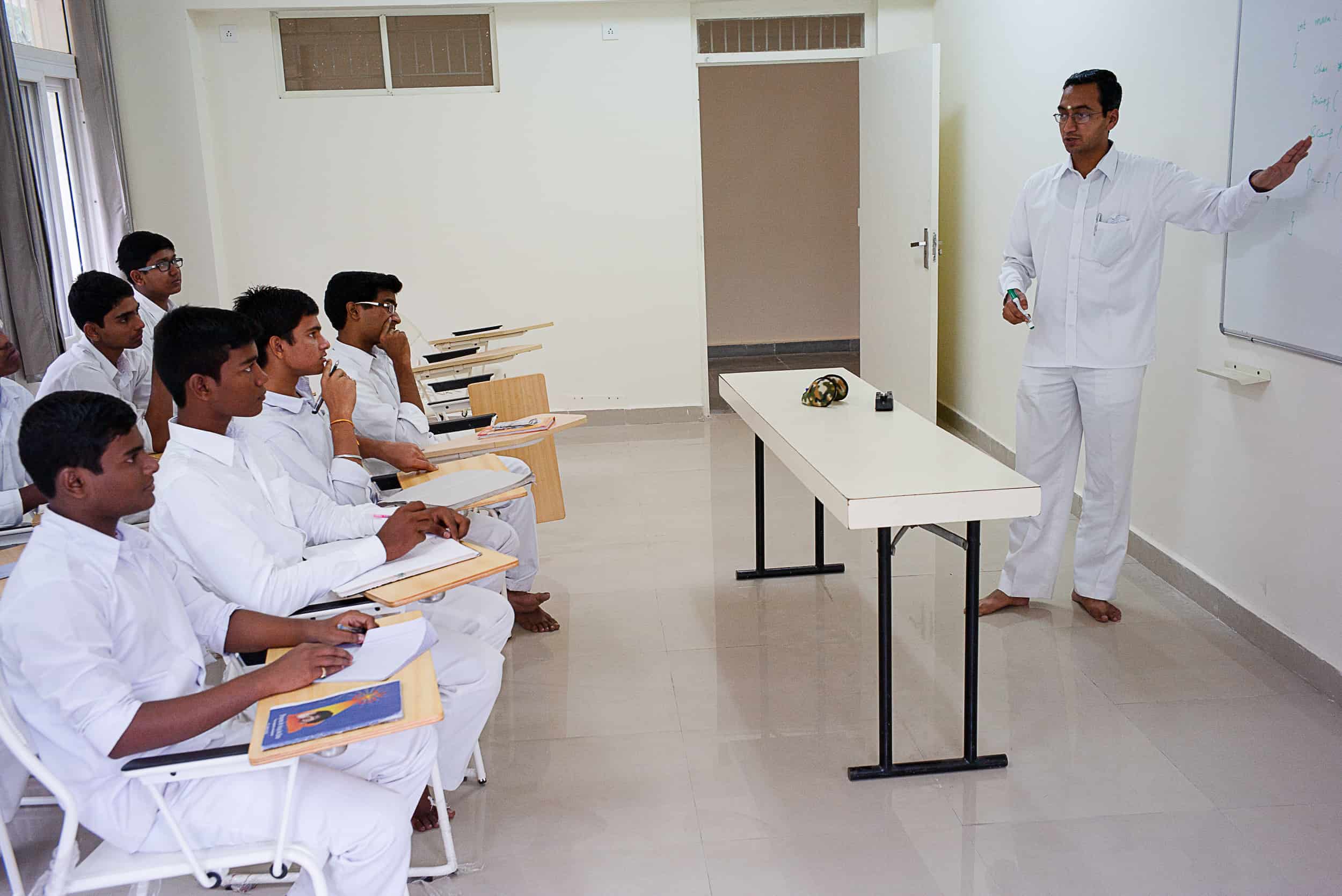Professional Programme
For Men

Duration: 2 Years
This is a master’s programme for students with backgrounds in science and engineering. It teaches the theoretical foundations of Computer Science and provides practical knowledge of computer systems.
This is achieved primarily through core theoretical courses. The programme is designed to include a software lab associated with each course, imparting working knowledge and programming skills for solving problems.
A well-structured list of electives from various areas, such as Computer Vision, Machine Learning, Data Analytics, High Performance Computing, and Software Systems, enables students to specialize in frontier areas of computer science.
The M.Tech. programme at SSSIHL allows students to customize their expertise through diverse specializations, including Intelligent Systems and Knowledge Engineering, Advanced Computer Networks, Human-Computer Interaction, Theoretical Computer Science, Computer Systems, Multi-Core and Parallel Computing, Software Engineering, and Mathematical Methods in Computer Science.
GENERAL ELECTIVES
Throughout the course, students can select their preferred focus in all four semesters, tailoring their academic journey to align with their specific interests and career goals. They can also choose from any four electives from a broad range of streams (see the list of Courses).
A comprehensive Viva Voce and project work in the second year prepares graduating students with the necessary knowledge and skills for the next stage of their careers upon graduation.
As a result, the specific programme outcomes include the application of knowledge in mathematics, computer science, and programming, the ability to identify and solve engineering problems in specialized areas, contribution to research and innovation, formulation of evaluation criteria for well-informed conclusions, understanding the global impact of engineering solutions for sustainable development, and professional functioning with ethical responsibility in both individual and multidisciplinary team contexts.
Graduates will have the necessary tools to succeed in diverse fields, fostering problem-solving skills through interactions with industry experts and emphasizing recognition for analytical, research, design, and implementation skills.
INTERNSHIP
Students are encouraged to undertake an Industry Internship for a minimum period of 2 months and maximum of 6 months after the first year of study.
All India Council for Technical Education (AICTE) approved programme.
- Either passed or appeared for final exams of one of the following:
M.Sc. in Mathematics / M.Sc. in Physics / M.Sc. in Computer Science / M.C.A., or
B.E. in Computer Science / B.Tech. in Computer Science - Candidates with a Bachelor’s degree (B.E. / B.Tech.) in Computer Science, Computer Science and Engineering, Electronics & Communications Engineering (with a background in Computer Science*) and Information Technology (with Mathematics background) are eligible to apply
- Familiarity with the following is mandatory for admissions:
Mathematics: Calculus of one and several variables, Sequence and Series, Linear Algebra and Matrix Theory, Differential equations and Laplace Transforms, Mathematical logic.
Computer Science: Data Structures and Simple Algorithms, Computer Organization and Architecture, Data communications and Networks, Database Systems, Languages Translators - Candidates with valid a GATE/CSIR/JEST score in relevant fields can appear directly for the second round of the admission process – Technical Viva Voce Round
- Age: preferably below 28 years on 30th June in the year of admission
*implies adequate, formal training and qualification from a recognized institution or relevant Computer / IT industry / academic experience for a minimum period of 5 years
YEAR 1
Semester 1
Design and Analysis of Algorithms
Practical: Design and Analysis of Algorithms
Advanced Computer Architecture
Practical: Advanced Computer Architecture
Practical: Parallel Processing, Parallel Processing
Elective – I
Seminar – I
Seminar – II
Semester End Viva Voce
Awareness Course I: Fundamentals of Indian Culture
Semester 2
Theory of Computation
Distributed Systems
Practical: Distributed Systems
Topics in Database Management Systems
Practical: Topics in Database Management Systems
Elective – II
Elective – III
Mini Project
Awareness Course II: Sources of Values
YEAR 2
Semester 3
Elective – IV
Problem-Solving Lab
Project Work Review
Awareness Course III: Work Culture, Ethics and Values
Semester 4
Project Work
Comprehensive Viva Voce
Awareness Course IV: SSSIHL’s Core Values and Philosophy
Electives
Stream 1: Intelligent Systems and Knowledge Engineering
- Artificial Intelligence
- Natural Language Processing
- Machine Learning
- Mining of Big Data Sets
- Deep Learning
- Fundamentals of Blockchain Technologies and Applications
Stream 2: Advanced Computer Networks
- Wireless and Mobile Networks
Stream 3: Human Computer Interaction
- Digital Image Processing
- Medical Image Processing
- Computer Vision
Stream 4: Theoretical Computer Science
- Advanced Algorithms
- Cryptography
- Design of Quantum Algorithms
Stream 5: Computer Systems
- Advanced Programming in the Unix Environment
Stream 6: Multi-Core and Parallel Computing
- High-Performance Computing with Accelerators
- Cloud Computing
Stream 7: Software Engineering
- Object Oriented System Design
Stream 8: Mathematical Methods in Computer Science
- Mathematical Methods in Image Processing
- Numerical Methods in Image Processing
- Mathematical Methods for Data Mining

